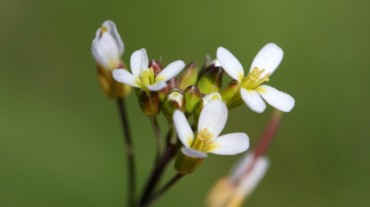
October is also known as breast cancer awareness month. A lot of awareness programs across the globe have been initiated to educate people about this deadly cancer. And just when this month is about to wrap up, the scientific community in the UK is sharing some great news. They have found a plant called “Cinderella”, which can combat breast cancer.
The plant, previously dismissed as not being medically useful, could prove to be a hero in disguise after scientists in the UK discovered that it not only stops the growth of breast cancer cells but does not affect normal cells – a potential first for future cancer chemotherapy treatment.
Arabidopsis thaliana, or thale cress which is often referred to as mouse-ear cress, is a small, weedy plant that grows in rocky, sandy and disturbed terrains. It now holds out promise for quicker recovery time and less secondary effects for breast cancer patients subjected to chemical treatment.
“The plant is very much like the ‘Cinderella’ of the medicinal plant world – no one thought it was so special, but it has shown its true colours via our research. The discovery has important implications in developing treatments for cancer as well as other diseases,” said Professor Alessandra Devoto, from the Department of Biological Sciences at Royal Holloway, University of London.

“Along with my colleagues from Brunel and Exeter, I am truly excited to have discovered the amazing impact this unassuming plant has on breast cancer cells. It just proves that even plants with a non-medicinal pedigree can work for cancer treatment,” said the plant biologist, who has been conducting this research since 2006.
’The “ground-breaking” research, by the team made up of Prof. Devoto, in collaboration with Dr Amanda Harvey at Brunel University London, and Professor Nicholas Smirnoff at University of Exeter, incubated the Arabidopsis thaliana leaves, treated with the plant hormone Jasmonate (a substance discovered in jasmine that boosts plant responses to stress), with breast cancer cells.
They found that although the cancer cells stopped growing, the normal cells remained unaffected. Their findings have been published in the peer-reviewed journal ‘New Phytologist’ this week.
Dr Harvey and Professor Smirnoff added: “Combined with recent progress in metabolic engineering and biotechnology, our approach will also facilitate production and analysis of bioactivities of valuable metabolites from plants on industrial scales.

“We are looking forward to continuing our collaboration with Professor Devoto to identify the plant-derived chemicals that interfere with breast cancer cells as well as with other diseases and to progress this research by gathering more funding to benefit society more widely.”
So, it looks like there is a ray of hope when it comes to the treatment of breast cancer. All thanks to – Cinderella.
Select Topics of your interest and let us customize your feed.
PERSONALISE NOW(With inputs from PTI)